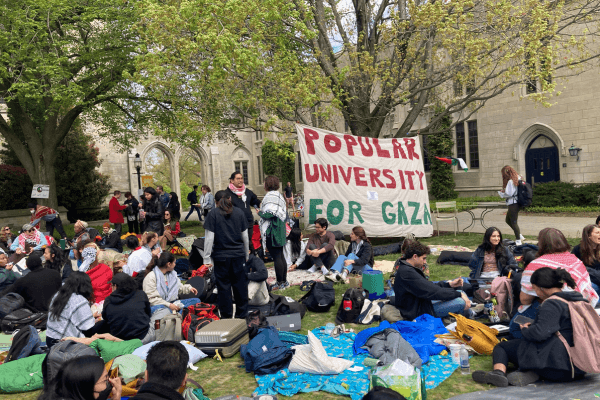But seek first the kingdom of God and his righteousness … (Matthew 6:33 NIV)
As Christians, we are citizens of the kingdom of God. But a common roadblock to dedicating our lives to the kingdom of God by loving our neighbors to the best of our ability is the temptation to allow our allegiance to the country in which we live supersede our allegiance to the kingdom of God — to succumb to nationalism.
Rather than viewing the world as a place filled with humans of unsurpassable worth who are made in the image of God, we can be guilty of categorizing people as citizens or non-citizens, immigrants and undocumented immigrants, refugees, outsiders, traitors, spies, and enemies. We adopt these labels from our politicians, media sources, and government. Instead of following the way of Christ as being the ultimate blueprint for how to love God and love our neighbors, we can mistakenly follow patriotic propaganda.
It’s easy for us to believe our own country is divinely favored, that it can do no wrong, that it did no wrong in the past, and that it’s better than every other nation. This superiority complex venerates our nation’s institutions, systems, and traditions, and it validates our political parties, military, government institutions, and historical documents. This can be a comforting lie to accept because it puts ourselves in the best possible light and exonerates us from any guilt or shame.
We can find great hope and comfort in nationalistic identities because they can provide a sense of corporate identity and purpose. It can be easy for us to turn nationalism into a false religion. We can deify national symbols as gods, and can become blinded by our devotion to our country. Nationalism can become another religion to us, and when this happens we want everyone to conform to our personal assumptions, opinions, and worldview.
We may not even realize when we’re participating in nationalism. Do we believe in the supremacy of our country and therefore the degradation of anyone who isn’t a part of it? Do we hate and attack those who dare criticize it? Do we assume we’re the best country in the world, and instead of celebrating the societal and economic successes of other countries, see them as a threat to our status? If your love of country is associated with a hate or fear of others, you’re engaging in nationalism.
This concept of social justice is a common target for the ire of nationalists because those who pursue social justice recognize the dignity of everyone, even those beyond their own national, cultural, religious, and socio-economic identities. When we abide by the principles of social justice, we celebrate the worth of everyone, even those who have different partisan, religious, philosophical, ethnic, racial, and cultural realities than their own.
Ever since Rome tried to quell the ministry of Jesus, nations — and their ardent worshippers — have tried to crush social justice because its goals and ideals are contradictory to nationalism’s aims of wealth, power, and domination. The work of social justice is the exact opposite of nationalism, the antithesis of exclusivity. It’s inclusive because it’s loving. By its very nature, the pursuit of social justice cannot coexist with nationalism, which is why the two continually clash.
Under the right circumstances, usually through the unbelievably brave leadership of extraordinary civil rights leaders and the determined grit of grassroots movements, a country may recognize the merits of social justice. Social justice advocates can be the impetus that extends human rights and create a society that’s more just, equitable, and loving. But just as often, nations and their governments suppress social justice for the sake of financial gain, political power, and pure selfishness. In these cases, they’ll martial all of their resources in a coordinated effort to destroy, delegitimize, defame, and stop social justice.
Nations and their nationalist devotees will attack social justice with an unparalleled maliciousness. Social justice will be smeared as “unpatriotic” and “immoral.” Religious nationalists will say it’s too divisive, and their theologians argue that it’s heretical. Nationalistic politicians will complain that it’s too controversial, and businesses will lobby that it’s too costly. Nationalists don’t believe that time, energy, and money should be spent loving their neighbors, and they’ll use any rationale to defend their attacks against social justice because they pursue their kings and kingdoms instead of Jesus (the King of kings) and His Kingdom.
Religion and “Christianity” (a Christless form of it) are common conduits of nationalism because they allow nationalists to pretend that their misguided passions are divinely ordained. In many cases, their hatred of others, along with their greed and bigotry and violence is actually fueled by a spirituality baptized in racism, xenophobia, and ignorance. It’s a religion blinded by conspiracy theories, a revisionist origin story, and an identity that assumes a quasi-divine right of power that is faultless. Nationalism uses religious rhetoric and spirituality as a front for their oppression and injustice.
When social justice work inevitably shatters this delusion, it’s fiercely opposed. The police, National Guard, and even Army might be deployed to stop it. Pundits will smear it. Politicians denounce it. People will get tear-gassed, beaten, jailed, and shot. Nations don’t give up their power easily. Yet in spite of the riot gear, guns, tanks, and row upon row of armed military commandos, in spite of bloodied bodies, cold prison cells, and broken hearts, love and justice finds a way. It always wins in the end. The laws of God declare that it be so. And if not on earth, then at least in the afterlife. At the very least justice will reign, if not here and now, then for eternity. Jesus has already won, and with his victory, justice cannot be evaded. Oppressors will receive judgement and injustice will face a reckoning. The great honor of social justice is to participate in such a divine process, to help bring about an eternal state of love and perfect justice.
Adoration for our country should never happen at the expense of us loving our neighbors. If our love of country inspires us to hate or fear others, we’re no longer engaging in anything holy or good. We must practice disassociating from our national identities in order to fully embrace our identity in Christ.
Practice immersing yourself in a new identity, a divine one, an identity that is part of a different kingdom that prioritizes sacrifice and love over everything else. Because eventually, inevitably, our country will fail humanity. It will maim, oppress, and kill. We must daily, hourly, minute-by-minute, make the conscious effort to pledge our allegiance to God’s kingdom, which will never fail to love.
Social justice work denies nationalism for the sake of loving humanity, because sacrificially loving others is what Jesus did. Christ loved the world even though it gave him up to be brutally crucified by an empire — Rome — that believed in its own power, its own wealth, and its own gods. At first it appeared that Rome’s power was greater, but only for a little while, for just three days to be exact.
Excerpted from On Love and Mercy: A Social Justice Devotional by Stephen Mattson. ©2021 Herald Press. Used with permission.
Got something to say about what you're reading? We value your feedback!







